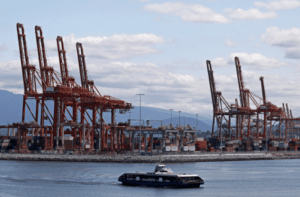
Vancouver Strike Revoked After Trudeau’s Crisis Meeting
Dockworkers on Canada’s Pacific Coast have canceled their planned strike after Prime Minister Justin Trudeau called an urgent crisis meeting. The goal was to protect the nation’s logistics and supply chain operations, which faced major risks due to ongoing port disruptions.
The strike notice, issued by the International Longshore and Warehouse Union (ILWU) Canada, was originally planned for Saturday, July 22. It was later withdrawn following a ruling from the Canada Industrial Relations Board (CIRB) and pressure from the federal government.
Trudeau’s Crisis Meeting and Immediate Action
During the crisis meeting, Prime Minister Trudeau stressed that restoring normal port activity was essential for Canada’s economy. He asked officials to explore every possible solution to protect supply chains, jobs, and businesses.
Trudeau warned that the strike could have caused serious economic damage and disrupted trade worth billions. His quick response led to a temporary resolution and the revocation of the Vancouver strike notice.
Why the Strike Was Declared Illegal
The CIRB ruled that the strike was illegal because the union failed to give the required 72-hour notice before halting work. After this ruling, the ILWU issued a new notice but later decided to retract it entirely.
The union’s move came after several days of tense negotiations and growing pressure from both industry leaders and federal officials.
Impact on Canada’s Logistics and Supply Chain
The strike disrupted operations at two key ports: Vancouver and Prince Rupert. These ports are vital gateways for Canada’s exports and imports, handling natural resources, manufactured goods, and raw materials.
According to the Canadian Manufacturers & Exporters (CME), the port shutdown affected around C$500 million in trade daily — totaling about C$6.5 billion ($4.9 billion) since early July.
This major loss highlights how important Vancouver’s port operations are to national and international logistics networks.
Government Response and Possible Legislation
Transport Minister Omar Alghabra said the government is exploring all possible logistics solutions, including back-to-work legislation.
However, this option is politically sensitive. While some parties support immediate government action to protect Canada’s logistics industry, others prefer that negotiations continue between the union and employers.
Political Reactions
The potential back-to-work law divided political leaders:
Supporters argue it is necessary to protect Canada’s economy and supply chain stability.
Opponents, including the federal NDP and British Columbia’s Premier, insist that talks at the bargaining table are the best solution.
Trudeau’s minority government faces a challenge. Passing emergency legislation would require support from opposition parties, such as the Conservatives or the Bloc Québécois. Doing so might also strain the Liberal–NDP partnership that currently supports his administration.
The Importance of Supply Chain Stability
The Vancouver strike has shown how fragile Canada’s supply chain can be. Even short disruptions can cause delivery delays, raise costs, and affect businesses across the country.
Experts believe the government must strengthen logistics planning and labor relations to prevent similar issues in the future. Maintaining stable port operations is vital for protecting trade and keeping Canada’s economy moving.
Conclusion
The revocation of the Vancouver strike after Trudeau’s emergency meeting has eased pressure on Canada’s logistics sector. Still, the situation exposed weaknesses in how strikes affect supply chain stability.
Going forward, Canada must focus on stronger labor agreements, faster conflict resolution, and better crisis management. Efficient ports are not only key for Canada’s trade but also for global supply chain reliability.


